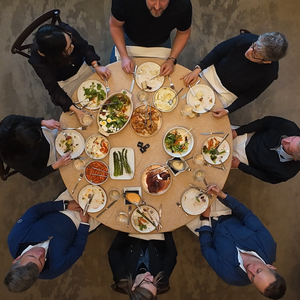
Invaio Sciences
Many successful life sciences startups are built on the back of a single big biological idea. Invaio is built on three. First: What if we could control the behavior of insects by manipulating their microbiomes? Second: What if we could achieve that control by leveraging the natural defense mechanisms of plants? Third: What if we could precisely deliver molecules that influence insect health by repurposing biological leftovers from cell division? Each idea could drive radical advances in agriculture and health. Together, they have the potential to transform one of the most fundamental aspects of life on earth: how we feed ourselves.
The problem Invaio is best poised to solve is the widespread heavy application of pesticides—a blunt approach to agriculture with “severe consequences for the diversity of insects in nature,” says Robert Berendes, Invaio’s executive chairman and an executive partner at Flagship Pioneering. “It’s not totally helpful for farmers: The crop yield is still often low, and there are occupational hazards. It’s also not helpful for the planet. Finally, more and more consumers don’t like the way their food is produced. Everyone needs a better solution.”
Origins
Invaio has had such a vision since the summer of 2017, when Barry Martin, special agricultural advisor at Flagship, and Ignacio Martinez, Invaio’s founding president and CEO and a Flagship general partner, led a Flagship summer exploration of the first big idea: The fact that insects, like humans, have microbiomes. In fact, they can’t function without them. The insect microbiome, housed in a specialized organ called an obligate microbial symbiont, supplements its host’s diet with critical amino acids and vitamins. If it falters, the insect may die or fail to reproduce. “Managing the health of the insect in a smart way, by modulating its microbiome, would be highly effective—you’d need very little active ingredient to affect the microbes,” says Berendes. “And if you could precisely deliver the active ingredient where it should be, you could dramatically reduce the amount of chemical compound you needed.”
The summer exploration team began to envision a future in which crop-damaging pests could be rendered harmless with tiny amounts of precisely delivered antimicrobials. As it developed a plan, it made additional breakthroughs. Flagship was building other startups in biomedicine based on a new understanding of exosomes—tiny vesicles that carry proteins, DNA, and RNA between cells. Could the same approach apply to plants? Plants use exosomes as defense mechanisms against pathogens. “They carry different payloads and cargo,” says Martinez. “So we thought, ‘Hey, we can use these as biological delivery systems for the molecules we’re developing for insect control.’”
Breakthrough
Finally, the team found the key idea to develop a new business. This one was not biological but physical—a miniature device with proprietary 3D-printed injection tips that could deliver biomolecules into a crop vascular system, allowing them to rapidly move throughout plants, where they would await uptake by insects. “We had the mode of action, the molecular delivery systems, the physical delivery systems,” says Martinez. “Now what we needed was AI to make sense of what could be possible.”
Advantage
The team started to build powerful computational models, including a project on “digital trees” to show the possible impacts of its platform on plant biology and ecology. Simultaneously, it started looking for two things that could make its big ideas a reality as soon as possible: large corporate partners who would accelerate Invaio’s progress, and real-world problems that needed solutions fast.
Today, there is no shortage of such problems, and crop-destroying pests are only one category of them. Invaio also hopes to boost the health of beneficial insects such as bees by medicating them with probiotics. Colony collapse disorder— the syndrome that causes adult honeybees to abandon their hives, which has been linked to a class of pesticides called neonicotinoids—“could be a super-target for this approach,” says Berendes. Invaio further plans to fight citrus greening, a devastating bacterial disease that is the tree equivalent of measles.
Focus
Although Invaio is currently focused on crop management, it is a life sciences company with the potential for much broader impact, because the implications of controlling insects don’t stop with agriculture. Most insects are rich in proteins, fatty acids, vitamins, fiber, and minerals. They’re an ideal cheap food source. Insects, in particular mosquitoes, transmit human diseases: Dengue fever infects 390 million people every year; malaria kills 3,000 people, most of them children, every day. What if those children could be saved by Invaio’s technology, and then fed by it? That would be preventive health care for the planet—including all the creatures that live on it, great and small.



